The Spinone . . .
In A Nutshell
What’s it like to live with an Italian Spinone Puppy?
The Italian Spinone is first and foremost a gundog and belongs to the subgroup: Hunt, Point and Retrieve (HPR) and has been around for hundreds of years.
What does HPR mean? The Spinone, like a lot of continental gundogs, are bred to more or less ‘do the lot’. They need to hunt for the game, point it, which tells the hunter where the game is, then bring it back once it has been shot by the hunter. They have very good noses and will follow scent tirelessly. The Spinone can work on any terrain: mountains, swamp, thick cover – undergrowth, thorn bushes.
You may not want to work your Spinone but you must remember that ‘instinct will out’. Just because you have bought one as a pet will not stop the dog doing what comes naturally, this goes for any breed of dog. So always look into what makes your dog tick.
This was a customarily docked breed until April 2007 when the Government changed the Animal Welfare Act. The Spinone, along with a lot of working dogs, were docked for a very good reason. As stated earlier they are bred to work on any terrain, this means that they will go into very thick, coarse cover and with an undocked tail, could cause them to have tail damage and a possible amputation, which in an adult is a full blown procedure.
Ok, we have given you the background of what makes up the Italian Spinone. So what would it be like to live with?
Spinone Puppies will be puppies and if left to their own devices become bored. A puppy comes with an active, inquisitive mind, but not an instruction manual. Animals do not understand the concept of being naughty; everything they do is instinctive. It is up to us, as good owners, to show them how to behave.
If you have left your puppy for hours on end and come home to find it has destroyed your very expensive shoes/settee/handbag/whatever, it hasn’t done this on purpose, it is bored and perhaps has taken to chewing to have something to do and perhaps also alleviate stress at being left on its own.
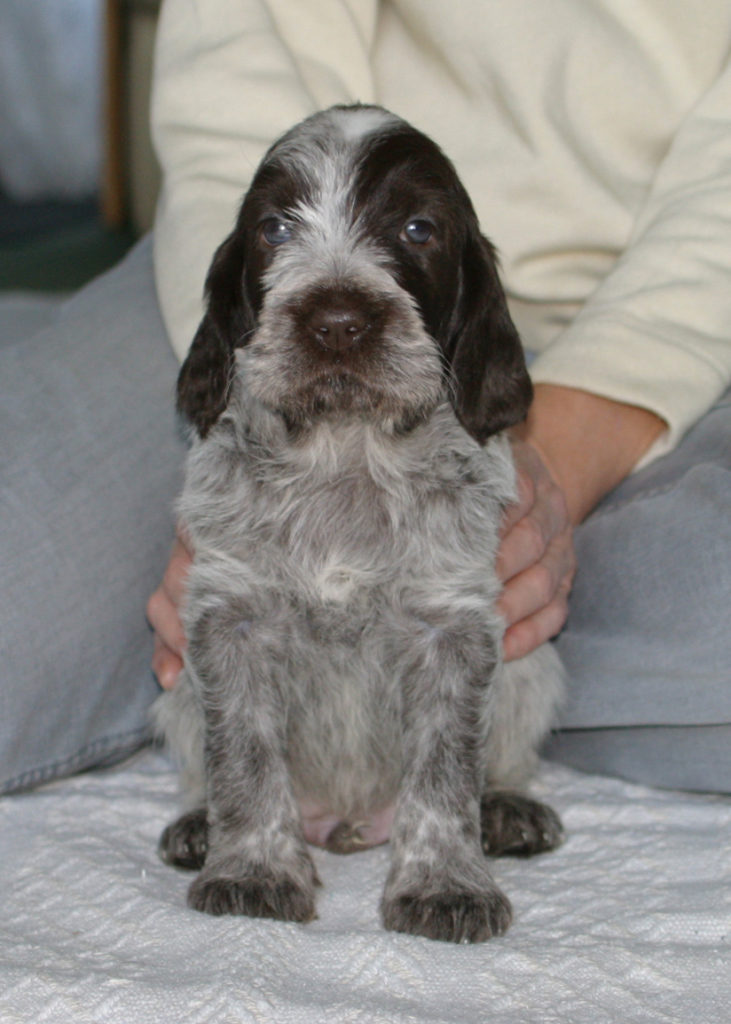
YOU SHOULDN’T TAKE ON A PUPPY UNLESS YOU CAN GIVE IT A LOT OF YOUR TIME, IF YOU WORK FULL TIME MAYBE A SPINONE IS NOT FOR YOU.
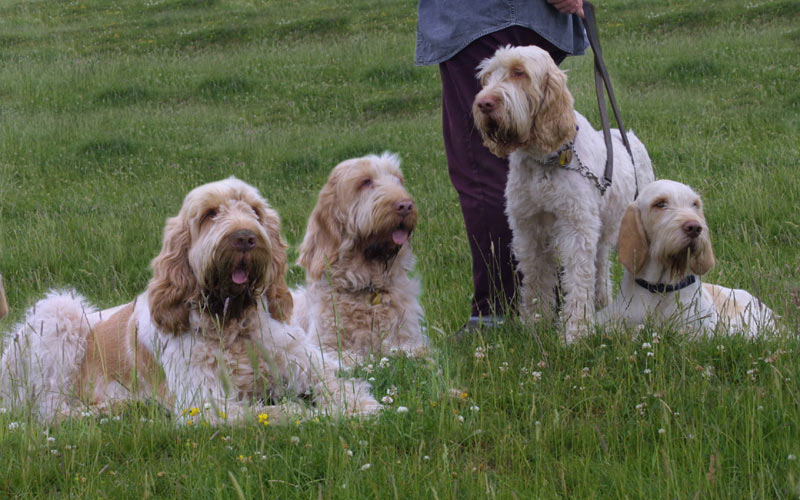
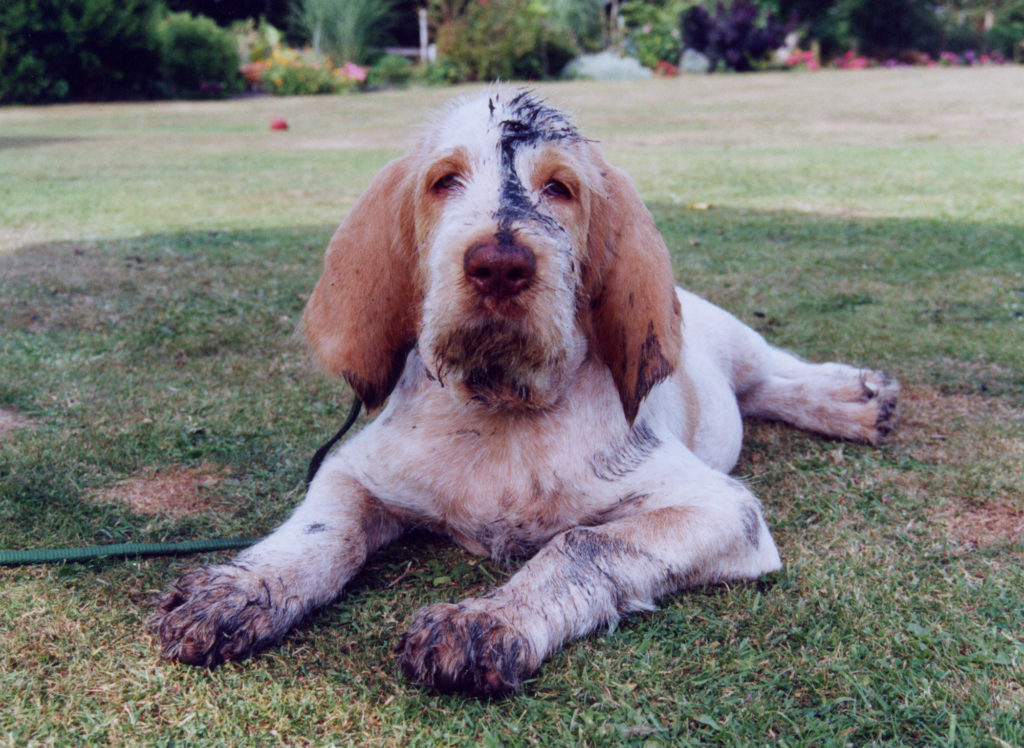
TRAINING YOUR PUPPY
Spinone Puppies need to be taught everything. Where to go to the toilet, how to meet and greet people/other animals and how to behave when they are let off the lead. So always find a good pet obedience class and take your puppy along to it. This is also very good for socialisation which Spinoni need to have more or less from the beginning, otherwise they can be apprehensive of people and places.
One of the problems that new owners seem to encounter, and not always understand, is that spinone puppies are naturally friendly dogs and will normally want to meet and greet other dogs/people when out for a walk. This is a natural behaviour for a spinone but frustrating if the puppy ignores you and doesn’t come back when called. How good your puppy is, is up to you. You need to put in the training and recall is one of the most important exercises you will need. Always make coming back to you a positive. NEVER tell a puppy off for coming to you even if it has taken all morning . . . praise is what is needed, you can use all the swear words you like but in a happy lovely voice!
Always remember that your Spinone is an HPR and that he will use his nose to follow a scent. Again with good training and bonding this shouldn’t be too much of a problem for long. They are fairly easy to train, as the majority are food orientated, so bribery and corruption is the way to go. However, you must never ever shout at a Spinone puppy, they have big hearts that bruise easily, sounds daft we know, but learn from our experience.
Training is an ongoing thing with young dogs, just because you take them to a training class once a week isn’t going to make your dog obedient. You have to do it day in and day out. Always remember that you are the one in charge not the dog. Dogs are pack animals and will try to become ‘top dog’; it is up to you to put the dog in his place. Gently but firmly. Once they know where they belong in the pack, they are happy. Contact the Kennel Club for a good training club in your area: www.thekennelclub.org.uk
Even if you are not going to work your Spinone, it wouldn’t be a bad idea to see if there is a gundog-training club in your area, especially a HPR one. We have a very good Field Trial Secretary who could possibly recommend a club/person in your area. Mrs Alix Johnson: 3girlsandtrev@lineone.net
MALE or FEMALE
Spinoni males go through a ‘teenage’ phase. They don’t drink, smoke or play loud music but can be stubborn and will huff and puff if they do not want to do what you want them to do. In fact, left to their own devices they can become hooligans. It is no pleasure to take them out, they pull on the lead and they totally ignore you if off the lead. This is a strong breed and the last thing you want when out with your boy is to have him lurching at anything and everything in sight. Teach him how to walk on the lead, teach him how to approach people, teach him what he can or cannot do, he won’t know until you show him. Animals do not know how to be naughty, they have no human conception on how things work, they do not feel or think as we do.
QUOTE: Male spins are just like the human male teen – thoughts of sex and the action of making a mess everywhere just about sums up their life.
Spinoni bitches can be ‘hormonal. Their seasons can be between 6-9 months apart (their first season will sometimes not happen until they are over a year old) and in the lead up to this can be a bit snotty. Some of them can change between their first and second season by becoming fussy with their food but this normally changes once the seasons regulate.
If your Spinone is going to be a pet dog you may think about having them castrated/spayed and your vet may suggest this early on. Please please do not rush into this and weigh up the pros and cons. Early neutering can result in other problems so it pays to wait until they are fully mature and finished growing.
Bitches do not need to have a litter. In the wild it is only the alpha bitch that mates with the alpha dog and produce young. The other females in the group tend to be ‘babysitters’.
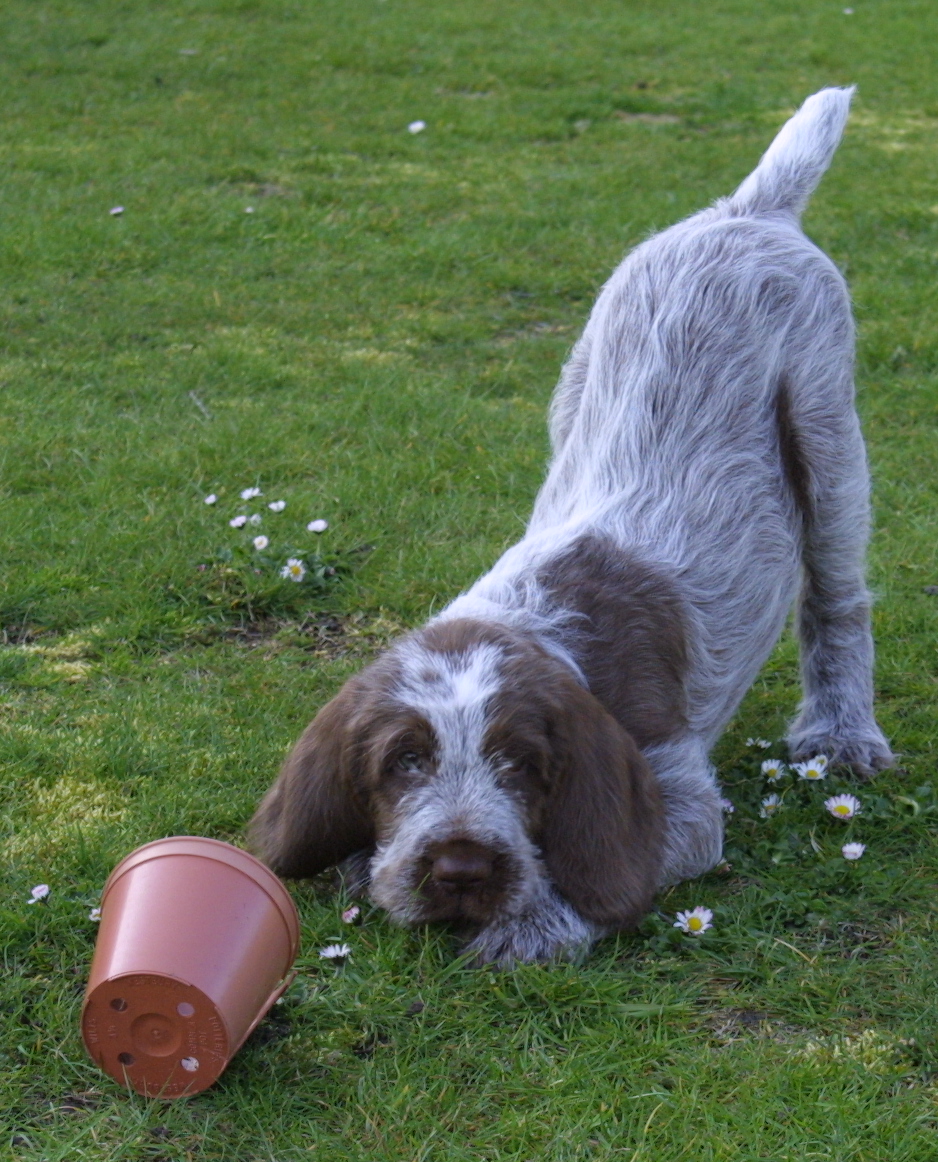
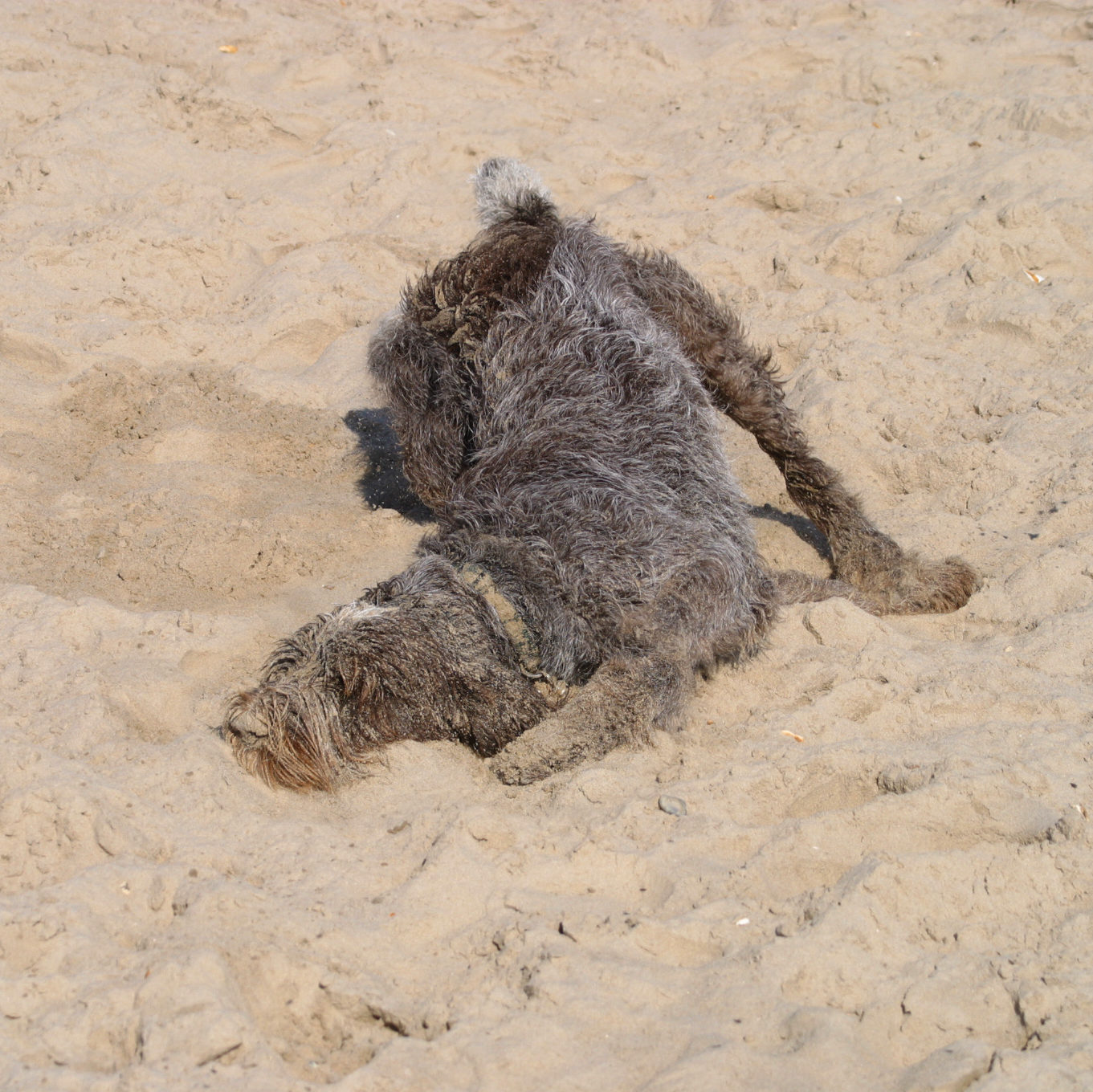
GENERAL MAINTENANCE
The Spinone has a coat that needs to be ‘hand-stripped’, literally meaning pulling the fur out with your fingers. This is a fairly easy procedure when their coat is ready to come out. Start doing this when there are very young, nothing will come out then but they get used to the feeling of it.
You will also need a stripping knife for their head and legs, a brush and comb, thinning scissors and ordinary scissors. These can be picked up at any pet shop/superstore. Get your breeder to show you what they use. In addition, not forgetting the all-important towel for their beards. The Spinone should be groomed a couple of times a week, this helps to keep their coat in good condition, getting rid of dead hair. They are prone to tangles under their armpits as the fur is softer here.
By regular grooming you are building up a rapport with your puppy. He gets used to being touched all over which is a good thing especially when they have to visit the vet. You will get to know your dog’s body so that any lumps or bumps are found you can get them sorted out. The ears need to be checked on a regular basis to make sure they are clean and there isn’t any build up of wax/dirt/grass seeds. The fur between their pads needs to be trimmed and be very vigilant about grass seeds in the feet (or anywhere). If left they will penetrate the skin and work their way through the body. At best it will result in an operation to remove it and at worst, if one ends up in the wrong place, it could be life threatening.
GENERAL HEALTH
Spinoni overall are a fairly healthy breed of dog. A brief lowdown of some of the things that they can suffer with follows, more detail can be found in our Health section.
• Joints: Taking care of joints, particularly when young, with care feeding and a sensible exercise routine, to prevent over speedy growth that can cause long term skeletal problems, arthritis and even abnormalities is vital. During the first year curtail the exercise of your spinone, they are a fairly robust dog and you need to protect their joints, so building up their exercise gradually during the first year is a must. As a general rule, 5 minutes walking per month of age at a time is plenty. So at 6 months 30 minutes, 9 months 45 minutes etc.
• Skin problems: Some Spinoni, in particular when young, can be prone to skin complaints. An incorrect diet, parasites or inappropriate bedding can causes these. Discuss your dog’s dietary and sleeping arrangements before you take your puppy home.
• Weight Gain: An overweight dog is a unhappy and unhealthy dog. Short term the dog will be unable to do what all Spinone should do and long term the dog may suffer problems with any or all of its most important functions, from heart, liver, bowel and kidneys to arthritis, eczema, diabetes and certain cancers. Consider carefully what you feed, and if unsure, ask for advice.
• Bloat/Torsion: This is a frightening condition that can affect any deep chested breed of dog. Bloat is caused by excessive air in the gut and will literally blow the stomach out until it is very large and hard. Torsion is where the gut twists until the supply of blood and oxygen cease. BOTH OF THESE ARE LIFE THREATENING AND NEED TO BE DEALT WITH AS AN EMERGENCY.
• Ectropion/Entropion: Ectropion is where one or both eyelids turn outwards and Entropion is where the eyelids turn inwards. Again, these can affect many breeds of dog and so are not isolated to the Spinoni though the condition can occasionally be seen in spinone puppies. Some vets will advise surgery but this is not always necessary, so seek a second opinion (possibly from your breeder or an experienced owner)
• Teeth: The development of the Spinone mouth is unique and can take a long time to settle. Canines growing into the roof of the mouth is not uncommon and most of the time will self correct. Increasingly, some vets may advise surgery. We strongly advise that you don’t rush into anything. It is a major operation to put a young puppy through and in most cases is unnecessary as the baby teeth will start falling out around 4 months of age.
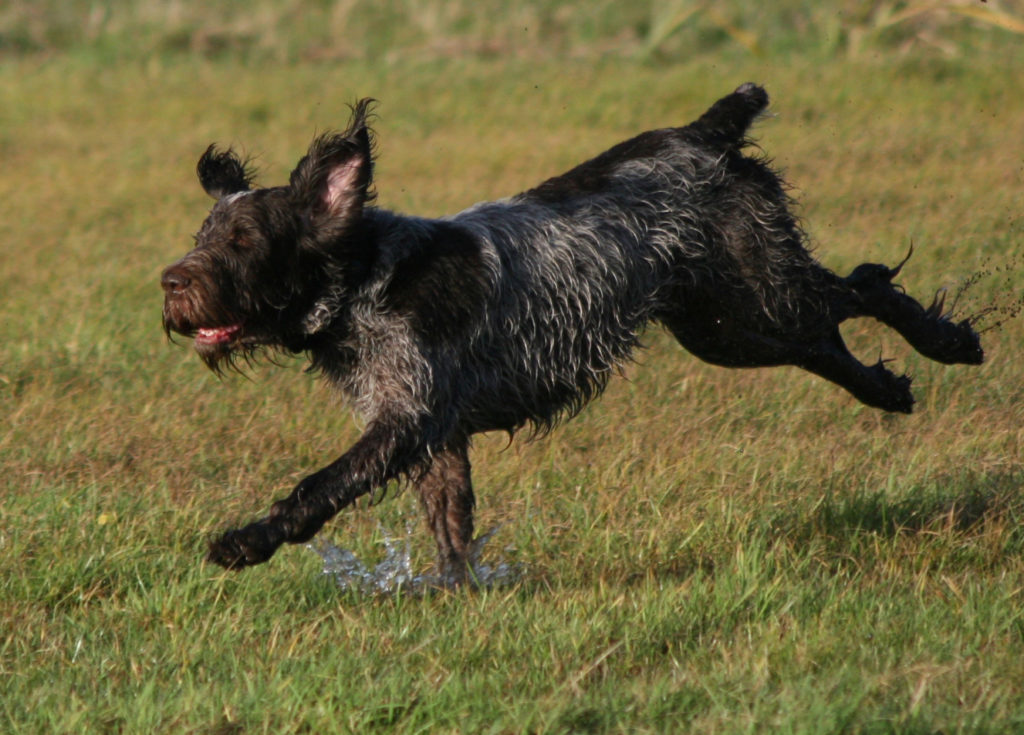
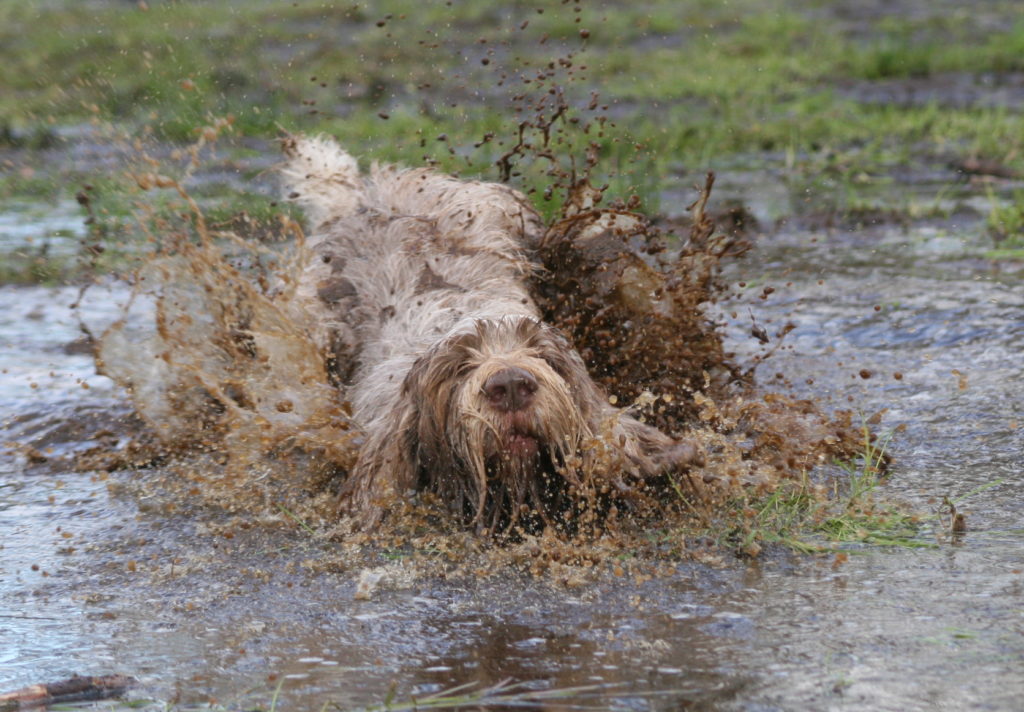

NEXT STEPS
If, after reading the above, you are still interested in the breed, the next step is to visit adult spinone. It is recommended that you meet, greet and get slobbered on by adults spinoni in their home environment. We have a good network of owners around the country who are more than happy for you to visit them and their dogs.
We also have an information pack available. Please contact our puppy register co-ordinator for more information. Mrs Alix Johnson: 3girlsandtrev@lineone.net
It is also a good idea to visit various dog shows and working events.
The club holds its own Breed Championship show (normally the last weekend in March) and Open show (normally during early August). Unfortunately at present, our events have been suspended due to Covid19. By coming along to our shows, you would be able to talk to various owners and get their views on living with this breed.